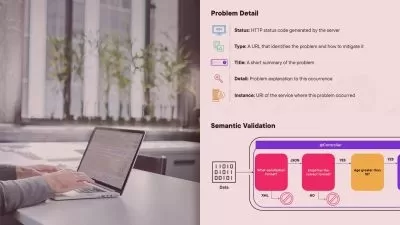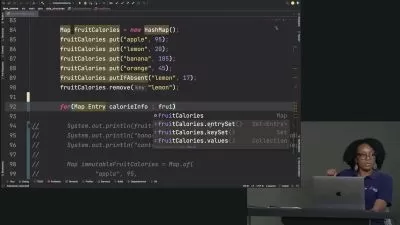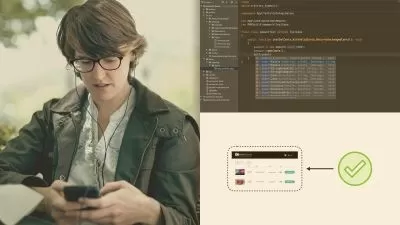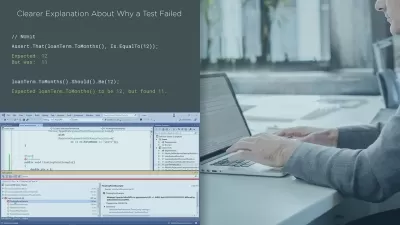JUnit Essentials: Unit Testing Mastery for Java Applications
EDUCBA Bridging the Gap
5:32:26
Description
Empower your Java development with comprehensive unit testing skills using JUnit.
What You'll Learn?
- The fundamentals of unit testing and its importance in software development. How to set up and configure JUnit for Java projects.
- Writing effective unit test cases and implementing various testing techniques. Advanced JUnit features such as annotations, assertions, and test suites.
- Practical application of unit testing principles through real-world projects and examples. Best practices for writing maintainable, reliable, scalable tests
- Techniques for testing different scenarios, handling exceptions, and parameterized testing.
- Strategies for integrating unit testing into the software development lifecycle for improved quality assurance.
- Continuous improvement in testing skills and staying updated with the latest developments in unit testing practices.
Who is this for?
What You Need to Know?
More details
DescriptionWelcome to our comprehensive course on "Mastering Unit Testing with JUnit." In this course, you will embark on a journey to become proficient in unit testing using the powerful JUnit framework, coupled with the Java programming language. Unit testing is a crucial aspect of software development, ensuring the reliability, stability, and maintainability of codebases. By mastering unit testing with JUnit, you will gain the skills and knowledge necessary to write robust, efficient, and maintainable unit tests for your Java applications.
Course Overview:
In this course, we will cover everything you need to know to become proficient in unit testing with JUnit. We'll start with the basics, introducing you to the fundamentals of unit testing and the JUnit framework. You'll learn how to set up JUnit in your development environment, write your first unit test cases, and explore various techniques for writing effective tests. As you progress through the course, we'll dive deeper into advanced topics such as test setup and teardown, test annotations, ignoring specific tests, and using different types of assertions.
Real-World Project:
To reinforce your learning, we'll apply your newfound knowledge to a real-world project: a Library Management System. You'll work on designing and implementing various components of the system while writing unit tests to ensure their functionality and reliability. This hands-on project will provide you with valuable practical experience and allow you to see firsthand how unit testing can be applied in a real-world scenario.
Advanced Topics:
In the final section of the course, we'll explore advanced topics in unit testing with Java and JUnit. You'll learn about fixtures, test suites, assert classes, and test case classes, as well as advanced testing techniques such as time testing, exception testing, and parameterized testing. By the end of the course, you'll have a comprehensive understanding of unit testing principles and practices, equipping you with the skills to write high-quality, testable Java code.
Who Is This Course For?
This course is suitable for Java developers of all levels, from beginners to experienced professionals, who want to improve their skills in unit testing and software quality assurance. Whether you're just starting with unit testing or looking to deepen your knowledge and expertise, this course will provide you with the tools and techniques you need to succeed.
Prerequisites:
While no prior knowledge of unit testing or JUnit is required, familiarity with the Java programming language is recommended. Additionally, access to a computer with a Java development environment installed will be necessary to follow along with the practical exercises and projects.
Conclusion:
By the end of this course, you will have the confidence and skills to write robust, efficient unit tests for your Java applications using the JUnit framework. Whether you're working on personal projects, collaborating with a team, or preparing for software development interviews, mastering unit testing with JUnit will be a valuable asset in your toolkit. So, let's dive in and start mastering unit testing with JUnit today!
Who this course is for:
- Java Developers: Those looking to enhance their software development skills by mastering unit testing with JUnit for Java applications.
- Software Testers/QA Engineers: Professionals aiming to improve their testing capabilities and understanding of unit testing principles.
- Computer Science Students: Individuals pursuing degrees or certifications in computer science or related fields, seeking to gain practical skills in unit testing.
- Quality Assurance Managers: Managers interested in upskilling their teams in unit testing techniques to improve the quality and reliability of software products.
- Freelancers/Consultants: Those offering development or testing services who wish to expand their skill set and offer more comprehensive solutions to clients.
- Tech Enthusiasts: Individuals passionate about software development and eager to learn about unit testing practices and tools.
Welcome to our comprehensive course on "Mastering Unit Testing with JUnit." In this course, you will embark on a journey to become proficient in unit testing using the powerful JUnit framework, coupled with the Java programming language. Unit testing is a crucial aspect of software development, ensuring the reliability, stability, and maintainability of codebases. By mastering unit testing with JUnit, you will gain the skills and knowledge necessary to write robust, efficient, and maintainable unit tests for your Java applications.
Course Overview:
In this course, we will cover everything you need to know to become proficient in unit testing with JUnit. We'll start with the basics, introducing you to the fundamentals of unit testing and the JUnit framework. You'll learn how to set up JUnit in your development environment, write your first unit test cases, and explore various techniques for writing effective tests. As you progress through the course, we'll dive deeper into advanced topics such as test setup and teardown, test annotations, ignoring specific tests, and using different types of assertions.
Real-World Project:
To reinforce your learning, we'll apply your newfound knowledge to a real-world project: a Library Management System. You'll work on designing and implementing various components of the system while writing unit tests to ensure their functionality and reliability. This hands-on project will provide you with valuable practical experience and allow you to see firsthand how unit testing can be applied in a real-world scenario.
Advanced Topics:
In the final section of the course, we'll explore advanced topics in unit testing with Java and JUnit. You'll learn about fixtures, test suites, assert classes, and test case classes, as well as advanced testing techniques such as time testing, exception testing, and parameterized testing. By the end of the course, you'll have a comprehensive understanding of unit testing principles and practices, equipping you with the skills to write high-quality, testable Java code.
Who Is This Course For?
This course is suitable for Java developers of all levels, from beginners to experienced professionals, who want to improve their skills in unit testing and software quality assurance. Whether you're just starting with unit testing or looking to deepen your knowledge and expertise, this course will provide you with the tools and techniques you need to succeed.
Prerequisites:
While no prior knowledge of unit testing or JUnit is required, familiarity with the Java programming language is recommended. Additionally, access to a computer with a Java development environment installed will be necessary to follow along with the practical exercises and projects.
Conclusion:
By the end of this course, you will have the confidence and skills to write robust, efficient unit tests for your Java applications using the JUnit framework. Whether you're working on personal projects, collaborating with a team, or preparing for software development interviews, mastering unit testing with JUnit will be a valuable asset in your toolkit. So, let's dive in and start mastering unit testing with JUnit today!
Who this course is for:
- Java Developers: Those looking to enhance their software development skills by mastering unit testing with JUnit for Java applications.
- Software Testers/QA Engineers: Professionals aiming to improve their testing capabilities and understanding of unit testing principles.
- Computer Science Students: Individuals pursuing degrees or certifications in computer science or related fields, seeking to gain practical skills in unit testing.
- Quality Assurance Managers: Managers interested in upskilling their teams in unit testing techniques to improve the quality and reliability of software products.
- Freelancers/Consultants: Those offering development or testing services who wish to expand their skill set and offer more comprehensive solutions to clients.
- Tech Enthusiasts: Individuals passionate about software development and eager to learn about unit testing practices and tools.
User Reviews
Rating
EDUCBA Bridging the Gap
Instructor's Courses
Udemy
View courses Udemy- language english
- Training sessions 37
- duration 5:32:26
- Release Date 2024/04/13















